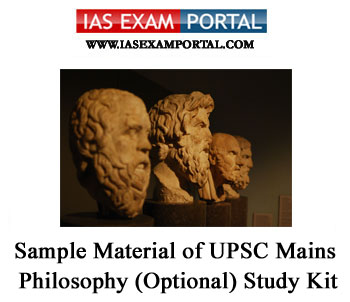(Sample Material) UPSC Mains Philosophy (Optional) Study Kit "Socio Political Philosophy (Ideal Communist Society)"

Sample Material of UPSC Mains Philosophy (Optional) Study Kit
Topic: Socio Political Philosophy (Ideal Communist Society)
This is the highest stage of social development and goal of Marxism. In this society, there will be no private property. Private property leads to class division and class division leads to emergence of state as a class instruments therefore due to absence of private property. Ideal society will be classless and stateless society.
Slogan of society will be – “From each according to his ability to each according to his need.” (No absolute equality – equality of need- may discriminate, who decide need – community –soviet, Anarchism – support social order, Good nature of Human & cooperation emphasized).
According to Marx, this will be state of complete equality and freedom. In this society, people will move from kingdom of necessity to kingdom of freedom. In this society, alienation of individual will stop and again ‘the lost man’ will become a humanized creature.
Criticism
1) Ideal communist society is an utopia.
2) Statelessness is not possible and in Marxist countries also day by day state
become stronger.
3) In ideal communist society, society will become stagnant.
Click Here for UPSC Mains Philosophy Study Material
Conclusion
As an ideal important, sound, logical but in practice not possible.
Marx View on State
According to Marx, state is nothing more than an instrument for exploitation of one class by other class.
Therefore, in Marxist philosophy state has been treated not as an institution of society but instrument. It promotes interest of ruling class only.
Marxist views on state have been explained in Engel’s book - “Origin of family, private property and state”. According to Marx and Engels, state comes into existence at a particular moment of History when class division takes place. It comes into existence for minority class protection from the majority ruled class.
Regarding nature of state Marxism believes state is exploitative. It is based on power state is the monopolizer of power which is reflected in form of various organizations like police, army, jail, bureaucracy. “In dictatorship of proletariat, state is a class instrument but first time it promotes interest of majority. In ideal communist society due to absence of private property there will be no class division and therefore there will be no state.
In words of Engels, “State will wither away”. Engel further says that state will be kept in museum where the iron axe and wooden table are kept.
Criticism
1) Marxist analysis of state is one sided
2) Marx made prediction that state will disappear which never happen.
Marx views on Religion
Marx – “Religion is the opium of people.”
In Marxism, religion has a negative meaning. Religion is a part of super structure. It creates false consciousness in individual.
Religion and opium has some similarities, opium separates individual from reality and creates illusionary world for himself. Similarly, religion also talks of Kingdom of god which does not exist.
- Opium makes person inactive and person under influence of opium does not perform any fruitful activity, similarly religion restricts revolutionary activity of workers.
- Under the influence of opium, persons forgets pain for a limited time, similarly religion also consoles individual.
Therefore, Marx believed that history has seen many Ceasors, Czars and Louis but under this influence of opium of religion people never revolted against them.
Criticism
1) Marx only analyses negative aspect of religion, but religion also teaches
love, cooperation, charity values.
2) Life of religious persons reflects emptyiness of Marxist negative evaluation
of religion.
Marx view on Alienation
Based on scientific socialism are the Marxist theory and notions but this view reflects humanity face or poetic nature of notion of Marxism.
Marxist theory of alienation has been explained in his book – ‘economic and philosophic manuscripts of 1844’ published in 1982.
George Lucas published writings of Young Marx- Alienation means separation of individual from his essence. In capatilist society, man becomes ‘cog in a wheek’. A labour which a source of creativity becomes a commodity therefore the individual is dehumanized because he looses his human essence and himself becomes machine in capitalism. Hence alienation is dehumanization of individual.
4 stages of alienation—
1) Alienation from products and production process
2) Alienation from nature
3) Alienation from fellow beings
4) Alienation from himself.
Causes of alienation
1) Private property
2) Over specialization (No feedback hence lack of sense of satisfaction of
work-fulfillment).
In the ideal communist society, due to absence of private property and specialization, alienation of individual will stop. The dehumanized individual will again have his human essence.
Recent debate on alienation (Neo – Marxism)
Some neo-marxist philosophers like Herbert Marcuse and Erich Framm have reinterpreted – alienation is light of consumerism.
In his book, ‘One dimensional man’ H. Marcuse points out that in contemporary capitalist society, only one aspect of individual is highlighted. This creates alienation in the individual.
According to Erich Fromm, in the contemporary capitalist society, due to growing consumerism individuals are surrounded with various consumer goods ultimately these consumer goods create boredom in individual which leads to alienation.
Criticism
1) Marx claim he has founded scientific theory but his theory of alienation
is unscientific.
2) According to Max Weber, alienation is a general trend in all industries, it
is not exclusive or specific to capitalism.
Significance
Alienation is still relevant though other Marsixt notion like class struggle and revolution lost their relevance. Alienation has still important notion to criticize capitalism therefore neo-marxist emphasize alienation more than any other.

